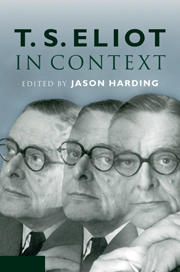Book contents
- Frontmatter
- Contents
- List of illustrations
- List of contributors
- Acknowledgements
- List of abbreviations
- Introduction
- PART ONE LIFE
- PART TWO FORMS
- 7 The role of intellectual
- 8 Publishing
- 9 Censorship
- 10 Literary journalism
- 11 Visual art
- 12 Dance
- 13 Drama
- 14 Music
- 15 Radio
- PART THREE LITERARY CROSS-CURRENTS
- PART FOUR POLITICS, SOCIETY AND CULTURE
- PART FIVE RECEPTION
- Further reading
- Index
13 - Drama
Published online by Cambridge University Press: 05 August 2012
- Frontmatter
- Contents
- List of illustrations
- List of contributors
- Acknowledgements
- List of abbreviations
- Introduction
- PART ONE LIFE
- PART TWO FORMS
- 7 The role of intellectual
- 8 Publishing
- 9 Censorship
- 10 Literary journalism
- 11 Visual art
- 12 Dance
- 13 Drama
- 14 Music
- 15 Radio
- PART THREE LITERARY CROSS-CURRENTS
- PART FOUR POLITICS, SOCIETY AND CULTURE
- PART FIVE RECEPTION
- Further reading
- Index
Summary
Imagine for a moment that a chatty, drawing-room comedy written in verse and based loosely upon Euripides'Alcestis, which took as its subject matter the pressures of marriage and the difficulties of redemption, climbed to number 3 on the New York Times bestseller list; that a press conference preceding the play's opening at the Edinburgh Festival was attended by more than a hundred members of the press from around the world; and that once staged in London and New York, it would be seen by over a million people. These, in fact, were the very circumstances that attended T. S. Eliot's third completed drama The Cocktail Party in 1949 and 1950, a situation that would be very hard to envision today. How did Eliot find himself in this position, and why were middle-class theatregoers flocking to a verse play in which a character doing missionary work and trying to ‘avoid the final desolation / Of solitude in the phantasmal world / Of imagination’ (CPP, 419) ends up being crucified by natives?
The answer is complicated, but as good a starting place as any is Eliot's lifelong habit of cultivating a persona of withdrawn reserve while at the same time attracting publicity to help advance his career. Eliot adopted the opposite approach of his friend Ezra Pound, who was renowned for his promotional schemes and for his extravagant dress and behaviour. Eliot depended instead on a quiet, coy manner that forced both public and private audiences to lean forward and pay careful attention.
- Type
- Chapter
- Information
- T. S. Eliot in Context , pp. 125 - 133Publisher: Cambridge University PressPrint publication year: 2011



